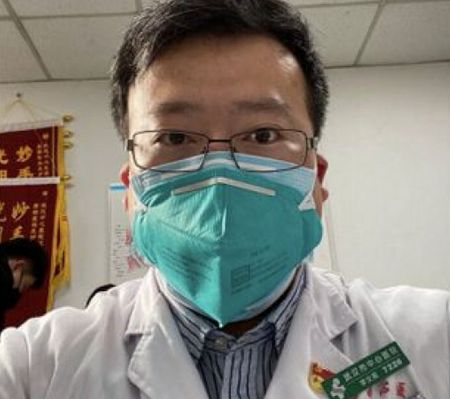CORONAVIRUS LI WENLIANG GIVEN THE ALERT AT THE PRICE OF HIS LIFE |
|
| Wenliang was killed Thursday by the WHO and the Communist Party newspaper before state media announced he was in "critical condition". The hospital welcoming him finally declared his death in the evening.
“In the fight against the epidemic of pneumonia due to the new coronavirus, our ophthalmologist Li Wenliang was unfortunately infected. He died despite all our efforts to bring him back alive. We are in mourning, ”confirmed the establishment, ending several hours of macabre uncertainty. After the announcement of his death Friday, on the Chinese social network Weibo, the tribute messages pour in "He gave the alert at the cost of his life", "You were the ray of light at night". This Thursday, WHO said on Twitter "deeply saddened" by the death of this man, continuing: "We must all celebrate the work he has done". Alert launcher As rumor of a mysterious virus spread in Wuhan last December, Li Wenliang shared his suspicions in a private conversation with colleagues who graduated from medical school via Chinese WeChat messaging on December 30. 2019. The doctor said in particular that seven people appeared to have contracted a disease similar to SARS - the respiratory disease that has spread in China and in a dozen countries, and caused hundreds of deaths in the early 2000s. patient was quarantined "in the hospital where he worked in Wuhan," he wrote, according to the Washington Post, urging colleagues to "be careful." Arrested for "spreading rumors" Badly took it from him. Li Wenliang and seven other doctors in the private group where they were chatting were summoned by the Chinese authorities and investigated for "spreading rumors" and "severely disrupting social order" on January 1. Questioned for several hours, he was forced to sign a report acknowledging that he "disrupts social order", details Le Monde. From the start of the epidemic, the Chinese authorities therefore try to control information about the virus. Wuhan police on the Weibo social network say they have taken "legal action" against people who "published and shared rumors online", "causing a negative impact on society". The following day, the information is taken up by the channel CCTV, the state television, which does not specify that the eight people accused of "spreading false rumors" are doctors, explains Le Monde. He was one of the first to sound the alarm about this new coronavirus which has, today, killed more than 560 and infected more than 28,000 people. Chinese doctor Li Wenliang is now a national hero, facing local officials accused of hiding the beginnings of the epidemic Chinese authorities in the sights At the end of January, the Chinese Supreme Court published an unusually critical article towards the police, whose zeal to track down "rumors" would have delayed awareness of the new disease. Wuhan police were pinned there for arresting eight people - including Dr. Li - accused of talking about an outbreak of SARS the day after Beijing reported the first cases of the new coronavirus to WHO. Rarely, the Supreme Court rehabilitated whistleblowers on January 28. She concedes that "the information provided by the eight people [including Li Wenliang] was not fabricated," reports Le Monde. The Court considered it useful to alert in good faith about the appearance of a new disease The Chinese government felt compelled to react only late in January. President Xi Jinping indeed stresses the need to quickly share information with the rest of the world, on January 20 only. On the same day, the results of the Wuhan authorities were increased to 198 cases and the transmission between humans was confirmed. Director of Human Rights Watch (HRW), Kenneth Rotha, denounced the "elimination" of reports on the virus in China during the first days of the epidemic, as well as Beijing's efforts to silence the criticism of him on social media. “The time is now for total transparency, even if it is embarrassing, because public health must come before the preservation of a particular political power. Unfortunately, this is not Beijing's approach, ”he said. Emotion and anger after his death On the group of private messages WeChat, the reactions of meditation and anger mix. "Let all these officials who fatten themselves with public money perish in the snow," carried away a surfer, in a comment promptly deleted by the censors. Another republished images from central China television announcing the doctors' arrest in December. If the authorities have allowed criticism of local officials to pass in recent weeks, comments published since the doctor's death have attacked the authoritarian nature of the regime. On Weibo, the hashtag "We want freedom of expression" was widely shared defying the taboos of censorship, before being blocked. Many Internet users circulate the song of Les Misérables Do you hear the people sing?, Hymn of the pro-democracy demonstrators in Hong Kong. | |
| Britney Delsey for DayNewsWorld | |
 |
|




